- Home
- Marthe Jocelyn
The Body under the Piano Page 3
The Body under the Piano Read online
Page 3
“You’ve left your troubled home behind,” Rose began,
“to seek new shelter far away.
May strangers on the road be kind,
And faith your guide along the way.
Bravely, you sailed landward, ho!
Facing peril with each tide,
Your heart steadfast, your eyes aglow.
We here await with arms held wide.”
Rose shot me a pleased grin and dramatically flung open her arms as the room rattled with applause. She put the notebook on top of the piano and held out both hands to me. I walked as gracefully as my wobbling legs could manage to join Rose and the dancers at center stage, willing myself not to faint. My ears buzzed through the final ovation, through Rose’s affectionate pat and Miss Marianne’s warm embrace, through Mummy’s hug and Charlotte bringing me a cup of fruit punch.
“All you had to do was read, for goodness’ sake,” whispered Florence.
“Next time,” I mumbled, praying that it be true.
Florence glared and slurped her tea.
The crowd was rapidly dispersing. Lavinia departed with her parents. Rose put the few remaining cakes and Uneeda biscuits into a tin from the pantry. Florence slumped, pouting, in a chair, waiting for her brother to finish his duties.
Mr. Roddy Fusswell stacked the cups and saucers, rinsed the creamers and lined up sugar bowls, each imprinted with the gilt-edged crest of the Royal Victoria Hotel. He brushed crumbs from the tabletop into the path of Miss Marianne’s broom.
“Don’t fling the crumbs about, young man,” said Miss Marianne. “We’ve had a few furry visitors this fall as the weather gets colder, and I do not want them to feel welcome!”
“So sorry, Miss Eversham. Don’t mention it to anyone, but it’s the same up in the hotel, mice nestling in for the winter. They’re too clever to nibble any poison we leave out and go straight for the sugar sacks!”
“I’ve tried everything,” said Miss Marianne. “I’ve got boxes of VerminRid in the pantry, but the little rascals just keep coming back. I don’t like the idea of traps.”
“Quicker though,” said Roddy. “One sharp snap and kkggh!” A sound meant to be the dying breath of a mouse. “Like a guillotine.”
“Ugh!” said Rose. “Perhaps you simply need to use more poison?”
Roddy Fusswell would return in the morning, with his assistants, to cart away the dishes and the tea urn. Leonard would fetch the splendid bouquets, and Mr. Teasdale’s volunteers would lug their bounty to the basement of All Saints Church. All foreign newcomers now resident in Torquay were invited to come on Sunday after the morning service to make selections according to their needs.
Miss Marianne was just finishing her sweep of the smooth wooden floor when the bespectacled stranger approached. In a low husky voice, he introduced himself as Mr. Augustus Fibbley, a reporter for the Torquay Voice. A reporter! I sidled closer, scooping up garments that had escaped from the donation boxes. Mr. Fibbley was gathering facts for a notice in tomorrow morning’s edition of the newspaper, he explained. Might he please take a program with him, in order that her name be printed correctly? Oh glory! An actual reporter had heard the world premiere of my poem!
“Miss Aggie?” Charlotte held my coat so that I could slip my arms easily into the sleeves.
I buttoned it slowly. The Mermaid Room was once again its dear, drab self after a brief transformation into a shimmering theater. How odd to think that I’d been struck catastrophically mute while my poetry had filled the room to grand acclaim. I had both failed and triumphed in the same moment!
“Miss!” said Charlotte.
Only one thing was missing from this being the perfect evening. Papa. He would have loved to be here. I pictured him with a beaming smile, head tilted, listening to every syllable. Perhaps he’d heard it all from Heaven.
“Miss!” called Charlotte again. I hurried to catch up. Leonard was here to fetch us in the pony cart. Belle neighed softly as we climbed aboard. Pulling on my gloves, I realized that I’d left my notebook behind. Not a big worry, I’d be back for my lesson in the morning.
Whoever could imagine that a corpse would be waiting upon the same floorboards where my poem had just been read aloud?
(cut from the Torquay Voice)
TOWN TALK
A collection was made last evening, of clothing and household items, to benefit needy immigrants and refugees who now are living as our neighbors in Torquay. Miss Marianne Eversham, proprietress and instructress of the Mermaid Dance Room, hosted an evening of entertainment and generosity. Students performed a dance arrangement and recited poetry created for the occasion. The pleasant gathering was supplied with fresh flowers and tasty refreshments from local benefactors.
A.F.
CHAPTER 4
A GHASTLY DISCOVERY
THE NEXT MORNING, a little after eleven o’clock, I was at the head of the line, waiting for my dance lesson to begin. Classmates shuffled and giggled behind me in the stairwell. The familiar notice, stitched in curlicued needlepoint letters, hung aslant on the door: PLEASE WAIT. But we’d been waiting simply ages and Miss Marianne was emphatic about punctuality. We were all agog to discuss last evening’s concert. I confess to hoping for a little more praise of my poetic contribution, despite my lapse in the performing of it. Miss Marianne might marvel at my cleverness loudly enough to quash any remarks made by Florence Fusswell.
Being in front, I wished to show a flash of leadership without needing to speak. I put down my dance bag on the top step and nudged the door with my elbow so it might drift ajar in an accidental manner.
“Miss Aggie!” Charlotte was ever alert to misdemeanors. I ignored her as the door creaked slowly open, and I slid inside…
The chairs used by last evening’s audience were tidily lined up in front of the mirrors along one side. The donation boxes, brimming with garments and bric-a-brac, had already been removed to the church by Mr. Teasdale’s team of husky volunteers. The piano stool was overturned and the fringed cloth dragged to the floor. A sugar bowl and milk jug sat atop the piano, next to my notebook. Pieces of a shattered teacup lay strewn on the floor in a puddle of milky tea.
And between the elegant legs of the grand piano lay a body.
Not, thank goodness, Miss Marianne. This woman was much rounder. Her head seemed crooked, mouth agape. Her legs—sticking out in a most unladylike way from beneath her skirts—were short and thick-ankled, encased in knitted stockings. Her feet lay at odd angles, as if they’d been kicking in protest. Nothing was kicking now. The contorted body was eerily still. I stepped closer and regarded the face, swollen and bluish-gray in color. One glazed eye stared sideways and a lace of foam ringed the open lips.
I felt the room sway. The woman was most certainly dead. And despite her disarray, I knew who it was. Who she had been.
Had she suffered a heart attack? Some sort of conniption? Was dull indigo the usual color of a dead person’s skin? Weren’t bodies meant to be ghostly white? Or was that only if the blood had been drained by leeches—or by the stab wound made by a knife? Might this be a murder? I could see no blood, but an unpleasant smell hovered in the air. Where was Miss Marianne? Was our dear teacher also dead? I scrutinized the mirror-lined studio.
What if…a ferocious tramp had crept in, or…a runaway madman from the Broadmoor Criminal Lunatic Asylum…or—more sordid and compelling—a cast-off sweetheart of Miss Marianne? Intent on revenge he’d gained entry by crawling through the window in the small pantry but found two women instead of only the one he was seeking…The stiletto knife was so swift and accurate that it pierced the heart, permitting no drop of blood to fall. The scoundrel gagged and bound his long-ago love, before stuffing her into a cupboard to writhe amongst the tambourines and dance tunics. The other woman lay beneath the grand piano, too portly to be shifted.
“Come away, miss!” Charlotte was suddenly
beside me, pulling urgently on my arm. Common sense made a brief appearance. We must prevent the other girls from seeing.
“Don’t come in!” I pushed past Charlotte to halt the others. “Do not enter.” I caught hold of the ballet barre for a moment’s support. I had just met a corpse. I willed the quaver from my voice. “There’s a dead body on the floor! Possibly murdered!”
Why did my mind fly to murder? Last night, Rose had wished her mother dead. Roddy Fusswell and Miss Marianne had suggested that Torquay would be a better place without Irma Eversham. And here she was, as dead as the elephant whose tusks had provided the piano keys above her head…
“Aggie Morton, you are the biggest fibber,” said Florence Fusswell. “You can’t get through one single day without making up a story.”
She stepped around me. My thumping heart skipped two beats when she began to shriek. Her nursemaid, Miss Boyle, tried to budge her from the doorway. Other curious girls attempted to peer beyond Florence, but soon retreated to shudder and sob in the stairwell.
Charlotte clamped a firm hand on my arm. “Come, Miss Aggie. Easy now.”
Easy? No. But I would rather lie down next to the body under the piano than to start mewling like Florence Fusswell. Talking to strangers might be a challenge, but I would not lose my nerve before a corpse! Charlotte guided me toward the door. Her arm across my shoulders was something of a comfort, I confess.
“Move aside, girls, for Mercy’s sake!” Miss Marianne was at the bottom of the stairs, her voice several notes higher than usual.
And then a man. “I am a doctor. Let me pass.” He removed his top hat, scowling, and unbuckled the clasp on his black leather case. “All of you, clear off! This is a medical emergency.” He closed the door almost upon our noses. He had spoken a flagrant untruth. An emergency? A doctor could do nothing but look at the corpse and agree that she was dead.
Most of the girls had seen scarcely more than a stockinged foot, but a collective howling commenced as they obediently shuffled their way into the street.
I sagged against the stair railing.
I had not been permitted into the room last year after Papa died. Mummy said she was protecting me from a memory too heavy to bear. It was intended as an act of kindness, however vexing at the time. This meant that the corpse I’d just met was my first, thrilling and grim. It was thoughtful of Mummy to prevent me from seeing Papa in a similar state.
“I know who it is,” I whispered to Charlotte. “Who she is.”
Charlotte squeezed my hand and said yes, she’d seen too.
“Rose’s mother,” I said.
“Yes,” said Charlotte.
“So mean-tempered last night, leaving before we’d even begun.”
“She was never friendly,” said Charlotte.
I closed my eyes. “Rose is an orphan.”
Being unpleasant was not really a good enough reason to take one’s final breath under the legs of a grand piano. Poor, poor Rose! It was all so horrible. If Mummy ever died…I felt weak just thinking about it. Only last evening I’d been agonizing about reading my poem when something so very much worse was waiting to happen.
My poem! My eyes flew open. My writing book still sat atop the piano where Rose had laid it down last evening after the recitation.
Right over the corpse!
“Miss Aggie, no!” said Charlotte, but I had opened the door and slipped inside.
The doctor knelt on the floor, his hand encircling the dead woman’s wrist. He shook his head slowly, the back and forth motion making his extra chin waggle. The message was clear and no surprise to me.
Miss Marianne slumped awkwardly on the piano stool, twisting her hands together. Her face showed horror at my entrance.
“You may not be here, Aggie. Take her away, Miss Graves.”
“I’m so sorry, Miss Marianne,” I whispered. “I just…I left my…” I was reluctant to admit that I was intruding on a death scene for the sake of a notebook. But would it not be worse to have come in for no reason at all? I raced to the piano, snatched up my book, and retreated backward, dropping my eyes for only a moment to those ghastly, sticking-out legs.
“No!” Miss Marianne half-stood and waved her hands. “You mustn’t take…You cannot touch—”
“We’re so sorry to have disturbed you,” said Charlotte.
“Since you’re here,” said the doctor, “could you be of some assistance? We have need of a policeman.”
“We’ll go at once.” Charlotte snatched my hand and tried to yank me down the staircase, putting our balance in peril. I wrenched free, took up my dance bag and stuffed my notebook inside. My throat was thick with some feeling I could not name, my breaths rough and loud as I clattered down the steps.
Charlotte’s rebuke was swift and unpleasant. “That was shocking behavior! As if a notebook matters at such a time! Your mother will be woefully upset.” The skin around her nostrils had gone white and her freckles positively gleamed. “I cannot allow any further association with this grim affair. You will remain in the safety of Mr. Dillon’s shop until I return with a constable.”
“But I’m the one who—”
Charlotte raised her palm. “Not another word.” She maneuvered me through the sweet-shop door, and briefly told Mr. Dillon of the occurrence upstairs.
“Well now,” he said. “That’s not something that happens every day.”
No, indeed, it wasn’t, Charlotte agreed, and asked if, please, could Miss Aggie wait under his care until the police were fetched?
“Do not let her out of your sight, Mr. Dillon,” she added. “Though what greater woe she might encounter than a dead body, I cannot conceive!”
Tra-ling went the bell, and bang went the door.
Mr. Dillon sat me down and offered me a sugar lolly, as if I were an infant five years old. It was, admittedly, delicious and soon soothed my shivers. I’d been a loyal customer since I was younger than five. Mr. Dillon knew which sweets I liked best, and I knew him well enough to chatter as freely as with our own cook.
He turned to his telephone, asking to be put through to the Torquay Police Department.
“A constable is required at the Mermaid Dance Room on Union Street. At once!” Mr. Dillon hollered into the mouthpiece. “Above Dillon’s Sweets and Sundries. We’ve got what you’d call a candidate for the graveyard.”
He put the telephone speaker back into its cradle, and then tapped his lip with a plump finger. “Dead for certain, were she?”
I nodded, my mouth full of the sharp, sweet taste of lemon.
“Not long dead, though,” he said. “That I know. I only just saw her.”
I straightened up. “You saw her?”
The bell on the door jangled sharply, and in came the black-haired boy from last week.
“Well, well,” said Mr. Dillon. “My rescuer.”
“Hector!” I hopped off the stool.
“Hello, miss.” He pronounced it meese. “I bid you good day.”
“Wait till you hear!”
Agitation tangled my words and the story was not well told, but I believe he caught the gist. No teacher. Body! Piano. Spilled tea. Blue face! Pudgy legs. Screaming. Doctor. Notebook. Victim. Possible murder! Police!
“And Mr. Dillon has just informed me that he saw the dead woman enter the premises! Before she was dead. He was nearly the last person to see her alive!”
Mr. Dillon turned a bit pink at this notoriety, but objected at once. “I were far from the last, I assure you. The workers on those stairs were as busy as ants on a jar of honey this morning. Miss Marianne Eversham were up there overseeing all manner of backing and forthing.”
“So, if it was murder…” I said. “Oh, Mr. Dillon. If you saw the victim, think how likely it was that you also saw the murderer!”
“Let’s not go about making up stories, Miss Aggie,�
�� said the confectioner. His fat cheeks trembled as he wheezed out a chuckle. “There’s nobody saying that it were murder.”
Hector’s eyebrows shot up and down while he listened.
“What is the manner of her death?” he said. “Is she afflicted with—” He broke off to pat his chest right over his heart.
“Word has it,” said Mr. Dillon, “that she’d got no heart at all. You could have knocked me over with a rope of licorice, seeing Irma Eversham puffing up the street and going through that door.” He tipped his head toward the entrance of the Mermaid Dance Room. “I never saw her visit here, not once.”
“She was here last night,” I said. “For about six minutes. She was meant to watch our concert, but she went home early in a huff.”
With everyone hating her and wishing her gone.
“On the premises two days in a row?” said Mr. Dillon. “That’s rare, that is. They say those Eversham women are like a pair of pitchforks, jabbing at each other morning till night. The old Captain kept them civil, but since his passing…May he rest in peace.”
“At what time does she arrive?” asked Hector.
“When did she get here?” I said, at the very same moment.
Mr. Dillon rubbed his chin. “I noticed her pacing out front. She were waiting for the stairway to be empty. Blokes from the church were doing some heavy lifting with those crates. The gent from the hotel, he were up and down a number of times with his urns and his platters. She followed him up, finally. The flower chap came and went, maybe some others before that. Saturday’s a busy day in a sweet shop. I don’t see everything.”
“What is next to happen?” said Hector.
“A few minutes of blessed quiet and then Miss Marianne Eversham goes scurrying out. Soon after, you girls start coming.”
“I was first,” I said. “At the front of the line. That’s why I found the body. Miss Marianne wasn’t there to let us in.”
“I didn’t know there were trouble,” said Mr. Dillon, “until Miss Eversham come back with the doctor. She might’ve used my telephone, but perhaps she doesn’t know I’ve got one. I’m one of the first hereabouts. She fetched that Dr. Chase, who never smiles and never ate a sweetie in his life.”

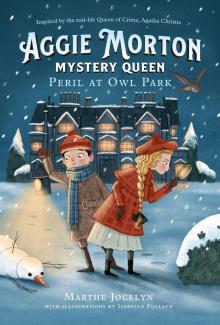 Peril at Owl Park
Peril at Owl Park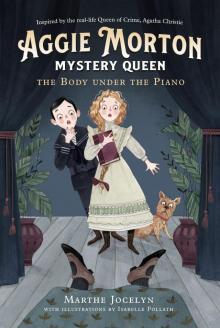 The Body under the Piano
The Body under the Piano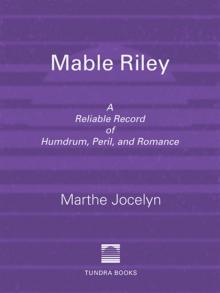 Mable Riley
Mable Riley Earthly Astonishments
Earthly Astonishments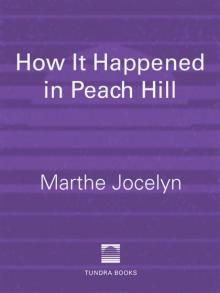 How It Happened in Peach Hill
How It Happened in Peach Hill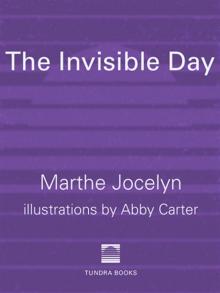 The Invisible Day
The Invisible Day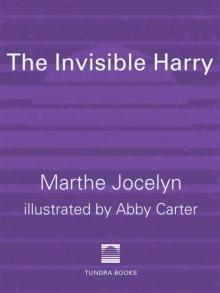 The Invisible Harry
The Invisible Harry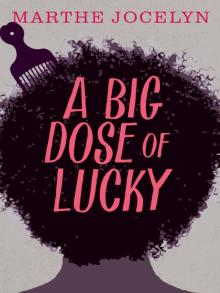 A Big Dose of Lucky
A Big Dose of Lucky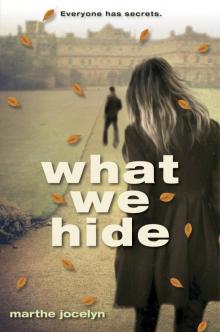 What We Hide
What We Hide Would You
Would You Secrets
Secrets First Times
First Times The Invisible Enemy
The Invisible Enemy Folly
Folly